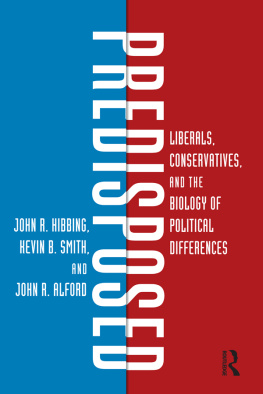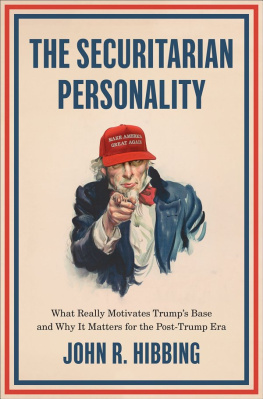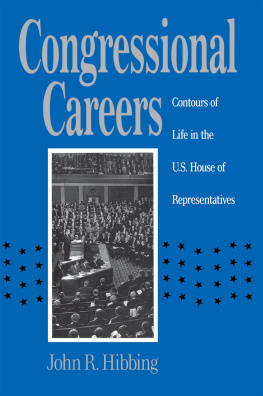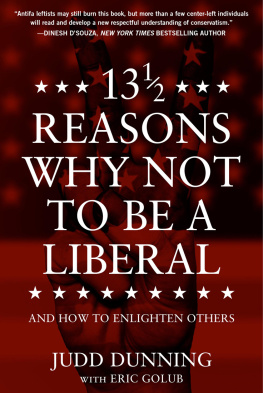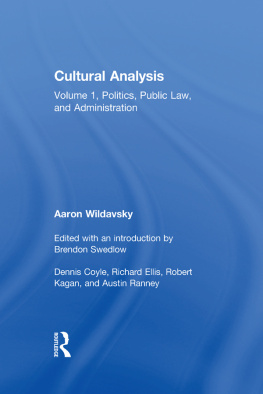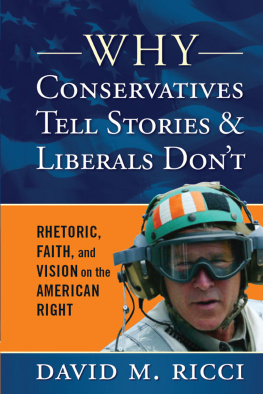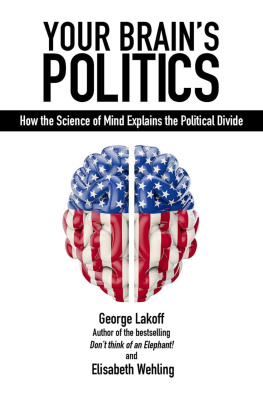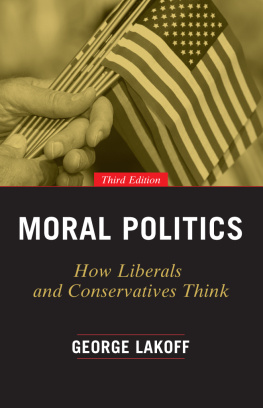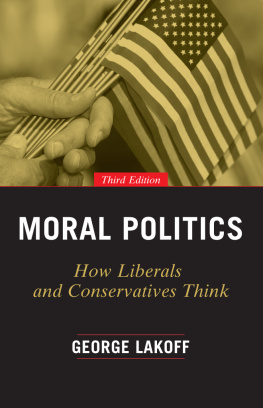Chapter 1
Living with the Enemy
Democrats: Sweaty, disorderly, offhand, imaginative, tolerant, skillful at give-and-take.
Republicans: Respectable, sober, purposeful, self-righteous, cut-and-dried, boring.
Clinton Rossiter, Parties and Politics in America
Politics is a blood sport where fights among spectators can be just as ferocious as the blows traded by combatants. Political exchange tends toward the emotional and primal rather than the reasoned and analytical, which is why it must have seemed like a good idea to ABC News in 1968 to televise a series of debates between William F. Buckley, Jr., and Gore Vidal. Both were ideologues Buckley for the right, Vidal for the leftbut ideologues in an educated, patrician, and articulate men-of-letters sort of way. Perhaps they could demonstrate to a mass audience that it was possible for debates between political opponents to employ words that were honest, intellectual, and constructive rather than pejorative, dismissive, and rancorous.
That sort of example was desperately needed in the United States in 1968, a time when people who disagreed with the political ideas of other people had picked up an alarming habit of shooting them or beating them senseless. Robert Kennedy and Martin Luther King, Jr. were assassinated; race riots raged in dozens of cities; and during the Democratic National Convention, anti-Vietnam War protestors fought the Chicago police for control of the citys streets in an epic eight-day running battle. Buckley and Vidal, then, must have seemed like just the ticket. They were smart and hyper-articulate, and their plummy, East Coast establishment tones made them seem so, well, civilized. Perhaps they could demonstrate a more mature way to deal with political differences. Or not.
In their most famous exchange, on August 27, 1968, Buckley asserted that Vidal was unqualified to say anything at all about politics, calling him nothing more than a literary producer of perverted Hollywood-minded prose. Vidal retorted that Buckley was always to the right, and always in the wrong, and accused him of imposing his rather bloodthirsty neuroses on a political campaign.
After that the gloves came off.
Shut up a minute, said Vidal. Buckley did not shut up. Vidal called him a proto- or crypto-Nazi. Buckley was not happy with that. Now listen you queer, he said. Stop calling me a crypto-Nazi or Ill sock you in the goddam face. Buckley went home in a huff and sued Vidal for libel. Vidal went home in a huff and, perhaps miffed that he didnt think of it first, counter-sued Buckley for libel.
So much for a civilized exchange of views.
At this point we could cluck our tongues and make highbrow academic noises about the degeneration of political exchange. We could point back to the early days of the American experiment and hold up the dignified Founders as better examples of civil and edifying political debate. We wont, though, because they, too, stuck in the shiv when it suited them. Like Buckley and Vidal, Alexander Hamilton and John Adams could be insufferable know-it-alls, intolerant of viewpoints other than their own. President Adams signed into law the Alien and Sedition Acts, making it a crime to say nasty things about the governmenta good deal if you are head of that governmentand Hamilton engaged in a personal feud with Vice President Aaron Burr so vitriolic it ended with Burr putting a musket ball through him. As an example of politics putting people on the boil, it is difficult to top the sitting vice president of the United States shooting and killing one of the prime movers and signatories of the Constitution. Other Founders werent much better. Thomas Jefferson and James Madison, held up in the United States as semi-divine political angels descended from Mount Independence, chucked mud with the best of them. Jefferson, for example, slandered his opponents on the sly. He bankrolled Callender was tossed in jail for violating the Alien and Sedition Act (score one for Adams) and Jefferson got a nasty bit of blowbackhe fell out with his journalistic attack dog, who promptly turned to writing titillating tales about Jeffersons affairs with an attractive slave named Sally Hemmings. Jefferson indignantly and, if you believe DNA testing on Hemmings descendants, wholly misleadingly said he did not have sexual relations with that woman.
Dont be smug if you are not from the United States; were willing to bet your political icons are not much different from the feet-of-clay rhetorical flame-throwers blistering each other under the Stars and Stripes. Show us a paragon of politics from any time and place and chances are we wont have to scratch the surface too hard before finding something like the Buckley-Vidal kerfuffle, in other words someone saying the other guys political views are so wrongheaded they merit a fast-moving fist to the schnoz.
People take politics seriously. They love validation of their own opinions and vilification of their opponents opinions. This is why conservatives make Ann Coulter, Michelle Malkin, and Mark Levin best-selling authors, Rush Limbaugh a wealthy talk-radio titan, and Fox News the most watched outlet on cable television. These sources can be counted on to tell their audiences that conservatives are noble defenders of the good and the just while liberals are stubbornly mugger-headed and oppositional. Driven by a desire to receive precisely the opposite message, liberals flock to the books of Al Franken, Michael Moore, and Molly Ivins, and the satire of television comedy like The Daily Show with Jon Stewart . Stephen Colbert of The Colbert Report has created a massively successful career around the persona of a shallow, jingoistic, uniformed conservative buffoon. Diatribes against liberals or conservatives enjoy a guaranteed audience of partisans all subscribing to the maxim, why be informed when you can be affirmed.
If we were of an avaricious bent, we could write another broadside against stupid, inbred, uninformed, malodorous, bloodsucking conservatives. If we really wanted the big bucks, we could pen a blistering condemnation of duplicitous, malevolent, degenerate, cretinous liberals. Such works sell very well among certain demographics and, having read a fair sampling of whats on offer, we see little evidence that it takes much effort or talent to get on a good rant. Authors of these popular political screeds rarely seem to invokelet alone conductsystematic research. Ginning up a truckload of demeaning adjectives to unload on one group or another? Sounds like it might be fun as well as profitable. Unfortunately, we are academics, so neither profit nor fun is what interests us most.
Besides that, the world does not need another book assuring readers that their political views are laudably correct while those of their political opponents are pathetically, dangerously, and rashly incorrect. Such books only pander to the worst instincts of those who care deeply about politics, encouraging extremity and discouraging dialogue. Ad hominem attacks on the political other side may be comfortingly confirmatory to readers and financially fulfilling to authors, but they are shallow, derivative, and polarizing.
In this book we aim to explain why people experience and interpret the political world so very differently. We want to provide liberals with a better appreciation for the conservative mindset; conservatives with a better appreciation for the liberal mindset; and moderates with a better appreciation for why those closer to the extremes make such a big fuss. We make no pretense that conservatives and liberals can be led to agree on everything, or even anything. Getting the Buckleys and the Vidals of the world to hold hands and sing Kumbaya around a campfire is just not going to happen. Pretending that some middle-ground nirvana can be reached if only we listen to the other side is counterproductive and a source of endless frustration. We are after smaller but important and much more realistic game. We want liberals and conservatives to understand why they are different from each other and why those differences frequently seem so unbridgeable.

